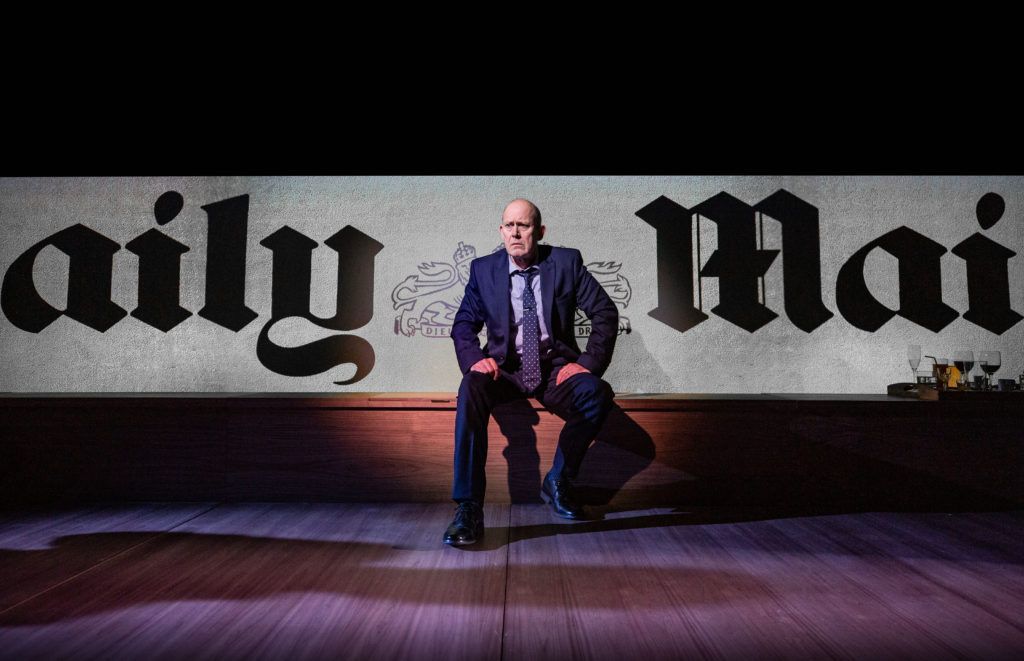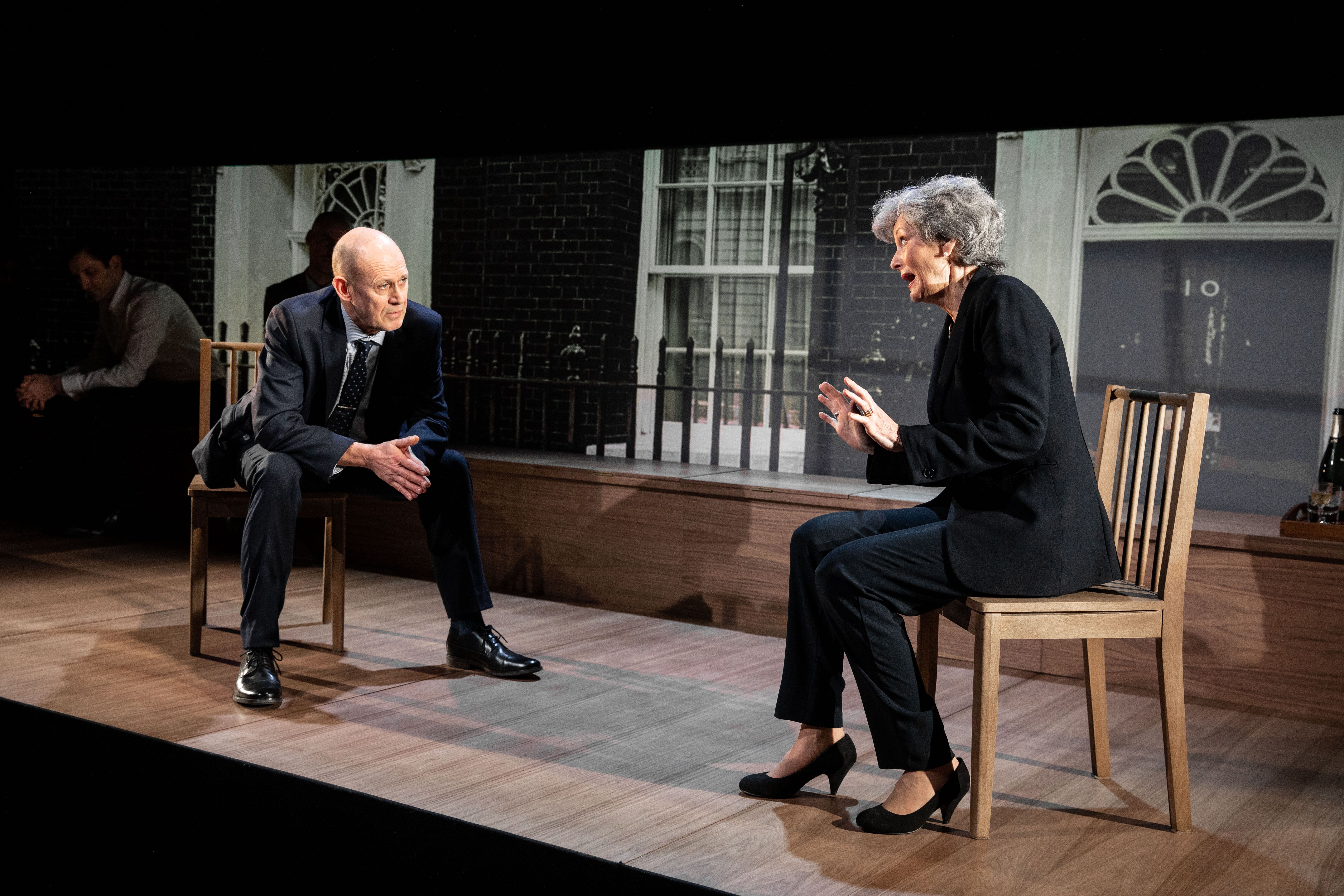Bloody Difficult Women runs in Edinburgh, Scotland, from the 3rd to the 28th of August – book your tickets here: https://assemblyfestival.com/whats-on/bloody-difficult-women/book-now
After a hugely successful extended run at the Riverside Studios in London, Tim Walker’s play – Bloody Difficult Women – is transferring to the Edinburgh Festival Fringe in August, the world’s largest arts festival in the heart of Scotland. This will run at the Assembly Rooms (Ballroom) from Wednesday, 3 August till Sunday, 28 August – and you can book your tickets here to avoid disappointment: https://assemblyfestival.com/whats-on/bloody-difficult-women/book-now
In an exclusive interview with NewsLeaf.com, Raza Hussain quizzes the debut playwright, Tim Walker, about how he feels the play will be received in Scotland, the challenges he faced during the play’s run in London, including his legal letters from the Daily Mail boss Paul Dacre.
Also, Tim Walker talks about how he feels theatre has failed to address the challenges of our times.
Interview
———————————————————————————————
Raza Hussain: So Bloody Difficult Women – your play inspired by Gina Miller’s court case in 2016 against Theresa May’s government over parliamentary sovereignty – is off to the Edinburgh Festival to play at the Assembly Rooms (Ballroom) from August 3 to 28. How are you feeling?
Tim Walker: Relieved and vindicated. A great many very powerful people wanted my play to fail in London, but, even though it had everything against it, it did great business. I’ve heard it described as the People’s Play, which is rather flattering.
We even had to extend the run to accommodate demand, which is, I am told, unprecedented for a straight play in these post-pandemic days. I don’t know how, but the play has come to somehow embody something. Maybe a spirit of defiance.
Raza Hussain: You say ‘everything was against it’?
Tim Walker: Yes. I mean even before we even opened, we had endless intimidating letters from the Daily Mail’s legal department, demanding that their boss Paul Dacre – who appears as a character in the play – be permitted sight of the script. The producer Denise Silvey and I had imagined, when we said ‘no’ for maybe the seventh time, he’d begin some kind of ruinous action against us. It struck us as ironic that the company was quietly sending these letters to us at the very time their paper was banging on about freedom of expression in relation to the legal action Meghan was bringing against them.
We had enormous financial headaches as it was, as we simply weren’t willing to compromise at all on the production values, so the costs kept mounting up. Opening immediately after the pandemic, it was, of course, hugely challenging finding investors, and then, to make matters worse, and still more expensive, Covid hadn’t gone away, and it kept felling our cast members, and, oh yes, we then learnt there’d be a tube strike on opening night and subsequent nights during the run.
- Bloody Difficult Women runs in Edinburgh, Scotland, from the 3rd to the 28th of August – book your tickets here: https://assemblyfestival.com/whats-on/bloody-difficult-women/book-now
God only knows how many well-meaning friends there were – a lot of them lawyers and doctors, anxious about my financial and physical health – who kept saying to me right up until the last minute that this really wasn’t worth the risk and maybe it’d be best simply to give up.
‘A great many very powerful people wanted my play to fail in London, but, even though it had everything against it, it did great business.’
One old theatre professional told me the ultimate blasphemy the play committed – the one big self-inflicted problem we had – was to directly and aggressively attack a lot of the papers that would normally be expected to review it. The play bashes not just the Mail, but also the Telegraph and all the Murdoch rags. He said no one had ever done that before, and it was up there, in terms of pure insanity, with the show Springtime for Hitler in the Mel Brooks film The Producers.
So, you can imagine, I had a lot of sleepless nights as opening night approached, but then I sort of thought, ‘well, if I don’t do this, I’m going to go to my grave wondering what would have happened if I’d done it.’ Still, it felt like a plane taking off in bloody awful conditions and I was the pilot just pulling back hard on the control column and going for broke. We soon passed the point of no return, and, thank God, got airborne.

Image: Tim Walker outside of the Supreme Court in London.
Picture credits: M. Raza Hussain.
Raza Hussain: So, it took a lot of courage?
Tim Walker: I’d love to go on about how I did it all on my own, but, honestly, it’s always the women who are the most courageous, so let’s just acknowledge here Denise Silvey, the producer of the play, who is just bloody amazing, and also Rachel Tackley, the boss of the Riverside Studios, where we put the play on, who responded to all our crises with amazing composure and good grace.
Raza Hussain: How do you reckon it will go down in Scotland?
Tim Walker: Johnson’s administration and Brexit has, of course, had a profoundly damaging effect upon Scotland, so, unstartlingly, there has already been a lot of interest in the play. It seeks to explain, in the course of a story of a dramatic confrontation between two women, how we have all got ourselves into this mess and how maybe we can get ourselves out of it.
I have great respect for the Scottish media – as I have, incidentally, for the Irish media – as they have managed to retain their independence, their professionalism and their dignity during the course of this nightmare that started in 2016, when so many English media organisations started to forfeit all three of these attributes.
‘…we had endless intimidating letters from the Daily Mail’s legal department…’
In terms of the play, I will value and respect the opinions of the Scottish media – whether they be good ones or bad ones – simply because I recognise they will not be approaching it from a position of blind prejudice, which is what we have had to contend with in terms of parts of the English media.
Anyway, William Burdett-Coutts, one of the really big names in theatre, reckons the play will do well in Edinburgh and it was his decision to give it a big stage up there, and I absolutely trust his judgement.
Raza Hussain: But don’t you worry a play about what’s happening in English politics won’t ultimately have much purchase in Scotland?
Tim Walker: Actually, I think from the outset people in Scotland have seen a lot more clearly what Johnson and Brexit was going to be like, and so I’m reasonably confident they will be a lot more receptive to what the play has to say than a lot of people in England. I might add that my middle name happens to be Buchanan and I’ve a lot of Scottish blood running through my veins so it’s not like I am totally an outsider. The Edinburgh Festival also attracts people not just from Scotland, but across the United Kingdom and the world, and advance sales are looking good.
Raza Hussain: It was an anxious time for you the last time we met, just before the opening.
Tim Walker: It certainly was, but it worked out better than I had dared even to dream. During the lockdowns – when it looked like the play might never go on at all – I used to lie in my bed fantasising about how it would all have gone, if we’d opened as planned before the pandemic.
In all honesty, I never dared to imagine success on this kind of scale. I mean the play seemed to take on a life of its own. Everyone seemed to want to see it. There were nights when I was just open-mouthed by who turned up – Sir Ian McKellen, Sir Ben Kingsley, Rosie Holt, Geordie Greig – the former Daily Mail editor – and then there were MPs like Rupa Huq, Rosie Duffield and Giles Watling, Baronesses Hussein-Ece and Campbell, Lord Pannick, journalists I really admire like Kevin Maguire, Michael Cockerell, Alastair Campbell, Fatima Manji, Sangita Myska and Adam Boulton. We never got Theresa May, or, needless to say, Paul Dacre, but we did get Gina Miller coming along, and she wrote an encouraging piece about it.
‘My sense is these paper tigers have had their day. Too many of their erstwhile readers in print and online have seen they lied to them over Brexit…’
Big theatre names like Bill Kenwright and Michael Grandage turned up, too. The list goes on and on. I probably shouldn’t name him, but, hilariously, at least one member of Dacre’s immediate family turned up – he even told Andrew Woodall, playing the part, how he’d got him absolutely right, only the real Dacre never drinks whisky, so, you know, there were a lot of surprises off-stage, as well as on.
- Bloody Difficult Women runs in Edinburgh, Scotland, from the 3rd to the 28th of August – book your tickets here: https://assemblyfestival.com/whats-on/bloody-difficult-women/book-now
Obviously it was just the fact that the auditorium was full, night after night, that meant the most to me. The audiences were lovely and hugely receptive. There were pro- and anti-Brexit people who came, but they all responded to the human drama they saw on stage. They all share now a sense of disillusionment with the calibre of the people in government and that is something that transcends political allegiances or how they voted on June 23 2016.
What especially cheered me was how youthful most of our audiences were, too. Theatre has been much too smug and complacent about what’s been happening in our politics, and I can understand why young people kept away, but they saw something in this play. It was willing to talk to them head-on about this utter mess. It levelled with them and never patronised them.

Image: Andrew Woodall as Paul Dacre in Bloody Difficult Women at Riverside Studios, London.
Picture credits: Mark Senior
Raza Hussain: What did you think of the reviews?
Tim Walker: The critics whose opinions I value the most were positive about it and that meant the world to me. Michael Billington said it was powerful, Mark Shenton – a man I once had a terrible feud with – wrote very kindly and movingly about it – and, much to my surprise, there was a lovely review by Lloyd Evans in The Spectator, so honestly I can’t complain. One of the major theatre websites even compared me to a young David Hare. I saw on Twitter that Kevin Maguire and Adam Boulton – two people who obviously really know about politics – had both given it five stars.
The Daily Mail, rather pathetically in my view, chose not to review it, and that, I know, was on orders from on high. This is a paper that can dish it out, but can’t take it. Murdoch’s Times felt it had to at least admit it existed, but was inevitably scathing about it. I am still the theatre critic for The New European and we theatre critics do talk, so I know exactly what was going on.
Some non-dom newspaper tycoons predictably didn’t like the idea of Bloody Difficult Women attacking them. That they failed to stop this play in its tracks is a little battle they lost.
‘…people in Scotland have seen a lot more clearly what Johnson and Brexit was going to be like…’
My sense is these paper tigers have had their day. Too many of their erstwhile readers in print and online have seen they lied to them over Brexit, and, if Sir Keir Starmer gets into office and abolishes their non-dom tax status, maybe they might finally sell up and retreat to tax havens elsewhere. If that happens, it can only be good for our country.
Raza Hussain: In spite of that, why did you think it did so well?
Tim Walker: I think simply because the play is entertaining – it seems to make people laugh a lot, it has a good and sometimes surprising story to tell, and, most of all, it’s not afraid to take a moral view about what our government is doing. Sadly, that’s all too rare these days.
I was recently watching a play at the National Theatre all about the assassination of Gandhi, and suddenly, in the middle of it, there was this random, incongruous line about Brexit. I suppose this was supposed to be our supposedly pre-eminent theatre daring to talk about what’s happening in our politics. It struck me as pitiful, really, how that was the most they felt they could do, and we were all supposed to go ‘oh, how very brave.’
I think of Arthur Miller writing The Crucible in America as a direct, no-holds-barred attack on McCarthyism at the very time it was happening, and I just wonder why our theatre has been so gutless during this uniquely challenging time.
The whole problem we’ve seen with the BBC and this weird doctrine of ‘false equivalence’ – all the truth about Brexit having to be presented, even during the referendum campaign and elections, with the same degree of respect as the lies – seems to have polluted theatre now.
- Bloody Difficult Women runs in Edinburgh, Scotland, from the 3rd to the 28th of August – book your tickets here: https://assemblyfestival.com/whats-on/bloody-difficult-women/book-now
A few years ago, we saw that bloody awful Channel 4 drama about Brexit written by James Graham and he lamely said at the time he just wanted to be fair to all sides. The journalist Carole Cadwalladr furiously said it was a whitewash of the calculated mendacity of the Leave campaign and of course she was right.
Graham went on to write a play about Rupert Murdoch that was so brave and challenging about him that Rebekah Brooks – Murdoch’s key executive in the UK – went and block-booked tickets for her and her colleagues to go and enjoy it.
I’m not, however, saying I am the only playwright out there now trying to tell it like it is. I went to the new Brixton House in south London the other night and saw a play called Kabul Goes Pop by Waleed Akhtar. I am a hardened old theatre-goer, but, you know, it had me in tears because, in the context of another great human story, it was a full-on cry of rage against how appallingly the West have handled themselves in Afghanistan and what has ensued. Akhtar is in my view an important playwright. He’s willing to talk honestly about the here and now and things we should all have on our conscience.
Raza Hussain: How has Bloody Difficult Women affected your relationship with Gina Miller?
Tim Walker: I’d say I was as tough on Gina as I was on Mrs May or even Paul Dacre in the play, but I think, in terms of our friendship, we have more or less worked our way through it. It remains intact, but, inevitably, this play has placed strains upon it. She gets, I think, that I was trying to be honest.
Raza Hussain: Plays that make it to the Edinburgh Festival often transfer to the West End, don’t they?
Tim Walker: You may say that, but I couldn’t possibly comment. I can say we’ve had a few people saying they might want to help with funding that transfer, but let’s see. I might add these are remorselessly commercial people who’ve come to us, so that is especially heartening. Of course, it would be great fun if that happened, as these Bloody Difficult Women have been a part of my life for so long now I’d kind of miss them if, after Edinburgh, that was the last I saw of them. I might add we have some television people working for a very well-known guy looking at adapting it for the small screen, but, again, let’s see.
Raza Hussain: The play has been good for you?
Tim Walker: It could all too easily have been a big humiliation for me, but, in the event, it turned out a lot better than I had dared to hope or dream. Audiences seem to share my enthusiasm for it.
If you have the political views I have, you don’t get to go on television much and you become pretty much invisible and most people probably assume you are dead. I was on the BBC and Sky all the time once – people used to make jokes about going to bed seeing me on the late-night paper reviews and then wake up to see me reviewing the same damn papers in the morning – but now, not at all. It strikes me as ironic that, when I had absolutely nothing to say for myself, I was on television all the time.
Clearly, I now no longer get to write, either, for the Daily Mail or the Daily Telegraph, the papers that used to employ me. So it’s rather thrilling the way the play has raised my profile again. The wonderful thing about theatre – and maybe, too, Twitter – is that, even in these McCarthyite times, it gives you the chance to go over the heads of all these jobsworth commissioning editors and say what you have to say.
Raza Hussain: Are you working on another play?
Tim Walker: Yes, I am.
Raza Hussain: What’s it about?
Tim Walker: Wait and see, but let’s hope it causes some mischief. On my gravestone, I want it written that I tried to cause trouble for our arrogant and hopeless ruling class right until the end. I did not go gentle into that good night.
- Bloody Difficult Women runs in Edinburgh, Scotland, from the 3rd to the 28th of August – book your tickets here: https://assemblyfestival.com/whats-on/bloody-difficult-women/book-now
_____________________________________________________________________________

M. Raza Hussain is an award-winning writer: the Extra-Mile winner of Newsquest’s Young Reporter Scheme and Young Writers also certified his ‘Talent for Writing’. Twitter: @raza_hussain01 Instagram: raza.hussain01



